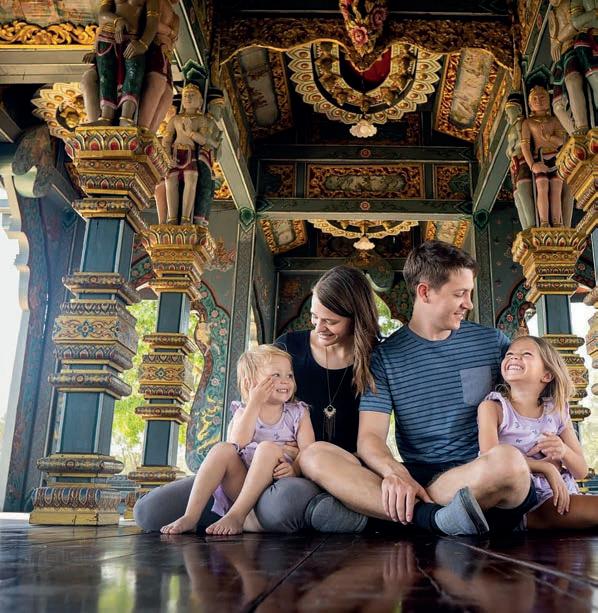
4 minute read
Moving Families
Raising Kids Abroad
If the thought of your being a bad parent because you’ve uprooted your kids ever crossed your mind, congratulations, you’re human.
Advertisement
I(Maayan) have spent countless nights wondering, why am I doing this to my kids? They shouldn’t suffer because I want to live my dreams. To be entirely honest, though, I believe it’s the best gift I could have ever given my kids, and I’ll explain why. But first, let me tell you how my sister and I came to this understanding.
Truth be told, when we first moved abroad, we were both very young kids. Nobody questioned whether we approved of the change or whether we wanted it. We had to go-along with our parents’ decision.
Back in the early 1990s, the gap between our home in Israel and our new home in France was enormous.
As children, having suddenly six TV stations instead of one, together with a VCR, was a game-changer.
We were unfamiliar with the scale of stores, the range of tree-green shades, the cultures represented at the neighbourhood school, and more. Although it was initially somewhat shocking, we rapidly adapted to this new reality.
At home, we kept living our ‘normal’ life, speaking our native language, following traditions, playing the same games. But outside, we started taking in the brandnew world. In addition to learning a new language, discovering food, experiencing ‘winter’ and its holidays, we even developed a new fashion style (questionable when looking at our childhood pictures).
Eventually, we adopted what we liked from it. And became international children. Mixing our own culture with the cultures we’ve met over the years.
As kids and teenagers, we saw it as a negative connotation because we were perceived as outsiders, those who didn’t belong, were different, and so on. With time, maturity, and self-development, we realized that it’s actually a beautiful mix. book, they weigh the pros and cons. These particularly resonated with us:
Personality development: Children who move abroad acquire the abilities needed to adjust to new settings and accept new cultures. They learn to overcome future challenges by learning how to accept constant changes.
Family bonding: Living abroad is ideal for strengthening family bonds because everyone is learning how to manage their lives in a new environment. Initially, kids may not have close friends and will rely more on you and their siblings for support, entertainment, and social interactions; this can have a positive impact on the family bond.
New is good: Despite popular belief, change can be positive and exciting. Children who move abroad can more easily develop positive responses to unexpected life changes. Being able to do so will allow your kid to enjoy life far more! “It is not the strongest or the most intelligent who will survive but those who can best manage change.” – Charles Darwin
Dr. Ruth Hill Useem, American sociologist and anthropologist, was the first to give this ‘mix’ a name – Third Culture Kids. Her study over the years revealed that, if handled appropriately, the advantages for kids who are exposed to cultures other than their own are likely to outweigh any drawbacks. Third Culture Kids: The Experience of Growing Up Among Worlds by David C. Pollock, Ruth E. Van Reken and Michael V. Pollock, is one of the books based on this concept. In this
As kids, we were unable to recognise that we’re acquiring valuable life skills. As adults, it appears clear to us that these experiences of life abroad shaped us into adults who can “These experiences of life abroad deal with today’s uncertainty better, adapt to changes more shaped us into adults who can easily, and truly appreciate life deal with today’s uncertainty wherever we are. And we see this way of looking at life as a gift from better, adapt to changes more our parents that we can now pass easily, and truly appreciate life on to future generations. wherever we are.” Despite the common challenges of expat life that I faced, and witnessed my parents face, I decided to relocate to give my daughters new opportunities, teach them to be open minded, to embrace change, and to be welcoming of what the world has to offer. I truly believe that the benefits outweigh the struggles, and that they will eventually mature into better adults. I understand my kids’ challenges, but I have consciously chosen not to make a big deal of it, to help them see the opportunities beyond the obstacle, and, most importantly, to encourage them to be themselves wherever they are. By setting an example, I enable them to explore new cultures, languages, and lifestyles and adopt only those aspects that are compatible with who they are and who they want to become. To make a long story short, if you’re a parent who relocated abroad and is concerned about how it will affect your children, the truth is, it’s up to you. Children, like adults, face difficulties and discomfort while living abroad. However, if approached positively, such drawbacks may be surpassed by the incredibly priceless and extraordinary long-term rewards. So, all you got to do is… Go. See new things. Be curious. Change. Try. Fail. Live.
Follow Maayan and Gal @smoozitive











